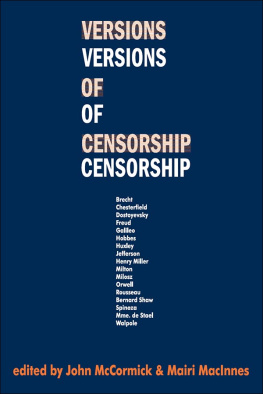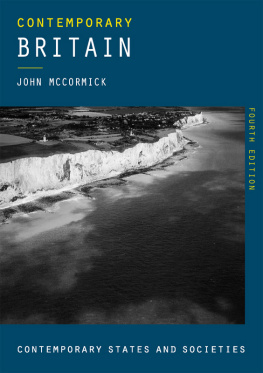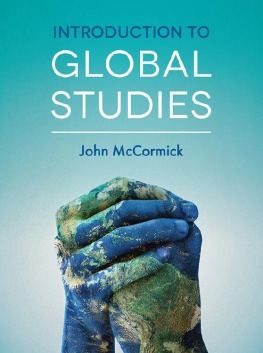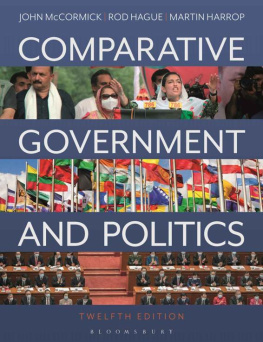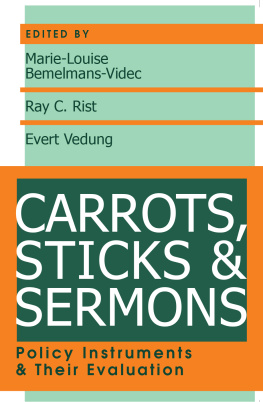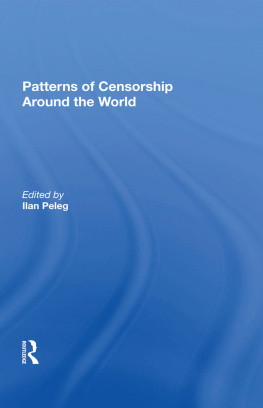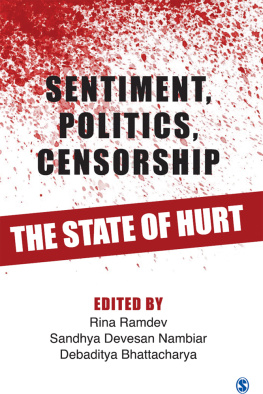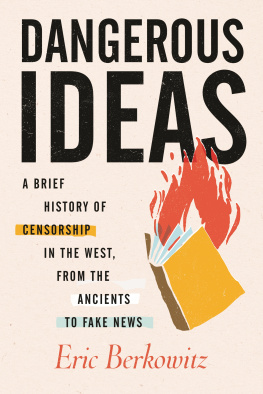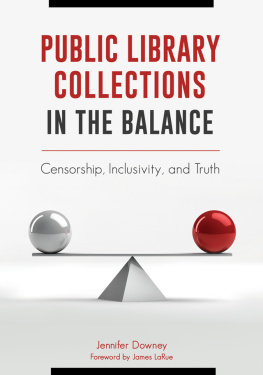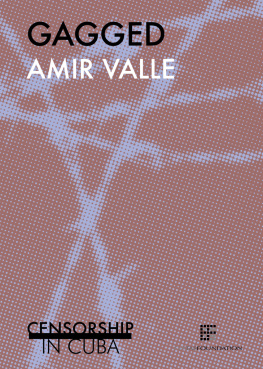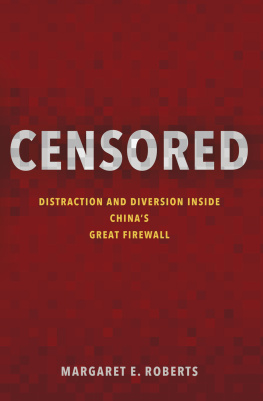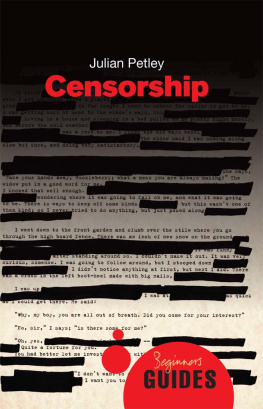VERSIONS
OF
CENSORSHIP
First published 1962 by Transaction Publishers
Published 2017 by Routledge
2 Park Square, Milton Park, Abingdon, Oxon OX14 4RN
711 Third Avenue, New York, NY 10017, USA
Routledge is an imprint of the Taylor & Francis Group, an informa business
Copyright 1962 by John McCormick and Mairi MacInnes.
All rights reserved. No part of this book may be reprinted or reproduced or utilised in any form or by any electronic, mechanical, or other means, now known or hereafter invented, including photocopying and recording, or in any information storage or retrieval system, without permission in writing from the publishers.
Notice:
Product or corporate names may be trademarks or registered trademarks, and are used only for identification and explanation without intent to infringe.
Library of Congress Catalog Number: 2006045540
Library of Congress Cataloging-in-Publication Data
Versions of censorship / John McCormick and Mairi MacInnes, editors.
p. cm.
ISBN 0-202-30875-8 (pbk. : acid-free paper)
1. CensorshipHistory. 2. Freedom of expressionHistory.
I. McCormick, John, 1918- II. MacInnes, Mairi.
Z657.V47 2006
323.44dc22
2006045540
ISBN 13: 978-0-202-30875-3 (pbk)
CONTENTS
Acknowledgments are hereby made for permission to reprint the following: The Index Librorum Prohibitorum from The Vatican Story by Bernard Wall, 1956 by Bernar d Wall, reprinted by permission of Harper & Brothers. A Few Tips About Science from The Life of Galileo by Bertolt Brecht, translated by Desmond I. Vesey, i960, reprinted by permission of Helene Brecht-Weigel & Methuen & Co. Ltd., London. Soviet Genetics: The Real Issue by Sir Julian Huxley, by permission of the author. Khrushchev and the Trade-Unionists by permission of The New York Times. The Factual Heresy from A Discord of Trumpets, 1956 by Claud Cockburn, reprinted by permission of Simon and Schuster, Inc. Liberty of the Press in the United States and Unlimited Power of the Majority from Democracy in America by Alexis de Tocqueville, edited by Phillips Bradley, published by Alfred A. Knopf, Inc. and Vintage Books, Inc.; by permission of Alfred A. Knopf, Inc. Freedom of Speech and the First Amendment by Zechariah Chafee, Jr., reprinted by permission of the publishers from Howard Mumford Jones, editor, Primer of Intellectual Freedom, Cambridge, Mass.: Harvard University Press, 1949, by the President and Fellows of Harvard College. Defence of the Freedom to Read by Henry Miller, by the author; reprinted by permission of New Directions. Ketman by Czeslaw Milosz, reprinted from The Captive Mind by Czeslaw Milosz, by permission of Alfred A. Knopf, Inc., 1951, 1953 by the author. The Prevention of Literature from Shooting an Elephant And Other Essays by George Orwell, 1945, 1946, 1949, 1950, by Sonia Brownell Orwell; reprinted by permission of Harcourt, Brace & World, Inc. and Martin Seeker & Warburg Ltd. The Necessity of Immoral Plays from the Preface to The Shewing-Up of Blanco Posnet by George Bernard Shaw, by permission of the Public Trustee and The Society of Authors. Dream-Censorship reprinted from New Introductory Lectures on Psychoanalysis by Sigmund Freud, translated by W. J. H. Sprott; by permission of W. W. Norton & Co., Inc., 1933 by Sigmund Freud. The Letter to M. dAlembert on the Theatre by J.-J. Rousseau, translated by Alan Bloom as Politics and the Arts, i960; by permission of The Free Press of Glencoe, Illinois. The Expediency of Toleration, being chapter XX of Tractatus Theologico-Politiciis by Benedict de Spinoza, translated by A. G. Wernham; by permission of the Clarendon Press, Oxford.
Excerpts from Paideia by Werner Jaeger, reprinted by permission of Oxford University Press, Inc. Excerpts from The Myth of the State by Ernst Cassirer, reprinted by permission of the Yale University Press. Excerpts from Plato Today by R. H. S. Grossman, reprinted by permission of George Allen & Unwin, Ltd. Excerpts from The Catholic Viewpoint on Cens or ship by Harold C. Gardiner, S.J., reprinted by permission of Doubleday & Company, Inc.
One part of the fascination that censorship exercises is that like love or freedom or democracy, it does not readily lend itself to definition. Censorship and all it implies in terms both of our historical understanding and of issues of enormous moment in contemporary life defies brief definition because it is an idea that always engages our prejudices, penetrates to the dim regions where our manners and mores take form, and shapes our attitude to the rule law, while at the same time the responses it evokes, whether pernicious or benevolent, depend upon the actualities of the historical moment. Censorship fascinates us because its theory demands some decision on its practice whenever there is an intellectual or political crisis; it is one of the gauges of civilization; it is a measure of individual rationality and liberalism. As our world grows smaller and areas of choice diminish, the issue that censorship poses becomes more pressing even as our responses become weary and indecisive. History, which has accelerated so powerfully in recent decades, has diffused our attention, and we tend to overlook the most urgent of the threats to ourselves from ourselves.
Although censorship is by nature protean, we have attempted in the matter that follows to construct a definition out of cases, both historical and contemporary, that seemed to us to penetrate to the core of the subject. Although our exhibits are arranged in roughly chronological order, we have frequently violated chronology in the belief that the historicists approach is unsatisfying here and in fidelity to a conviction that our juxtapositions make possible certain insights that conventional chronology obscures.
The word censor is derived from Latin censete, to assess or estimate, which in turn derives from the Greek verb to estimate. In ancient Rome, dating from about 443 B.C ., the censors were two officials appointed to preside over the census, or the registration of citizens for the purpose of determining the duties they owed to the community. A. H. G. Greenidge writes, In the etymology of the word lurks the idea of the arbitrary assignment of burdens or duties. Varro defines census as arbitrium, and derives the name censores from the position of these magistrates as arbitri populi. This original idea of discretionary power was never entirely lost; although ultimately it came to be more intimately associated with the appreciation of morals than with the assignment of burdens. From the point of view of its moral significance the censorship was the Roman manifestation of that state control of conduct which was a not unusual feature of ancient societies. The ancient etymology of the word censor, together with the lurking suggestion of the arbitrary assignment of burdens, reminds us that the phenomenon of censorship originates in tribal society and is at least as old as authority itself.
This derivation also is our justification for beginning with Miltons Areopagitica rather than with a more ancient source. Historically, there was no true debate about censorship before the technological fact of the invention and diffusion of printing and the intellectual turmoil of the Reformation. The lack of challenge to the institution of censorship before the Renaissance reflects the state of human liberty in the ancient tribal organization of the city-state. To quote Fustel de Coulanges from later in our text: the citizens of the ancient city-state knew neither liberty in private life, liberty in education, nor religious liberty. The human person counted for very little against that holy and almost divine authority which was called country or the state.... The ancients, especially the Greeks, always exaggerated the importance, and above all the rights of society; this was largely due, doubtless, to the sacred and religious character with which society was clothed in the beginning.

